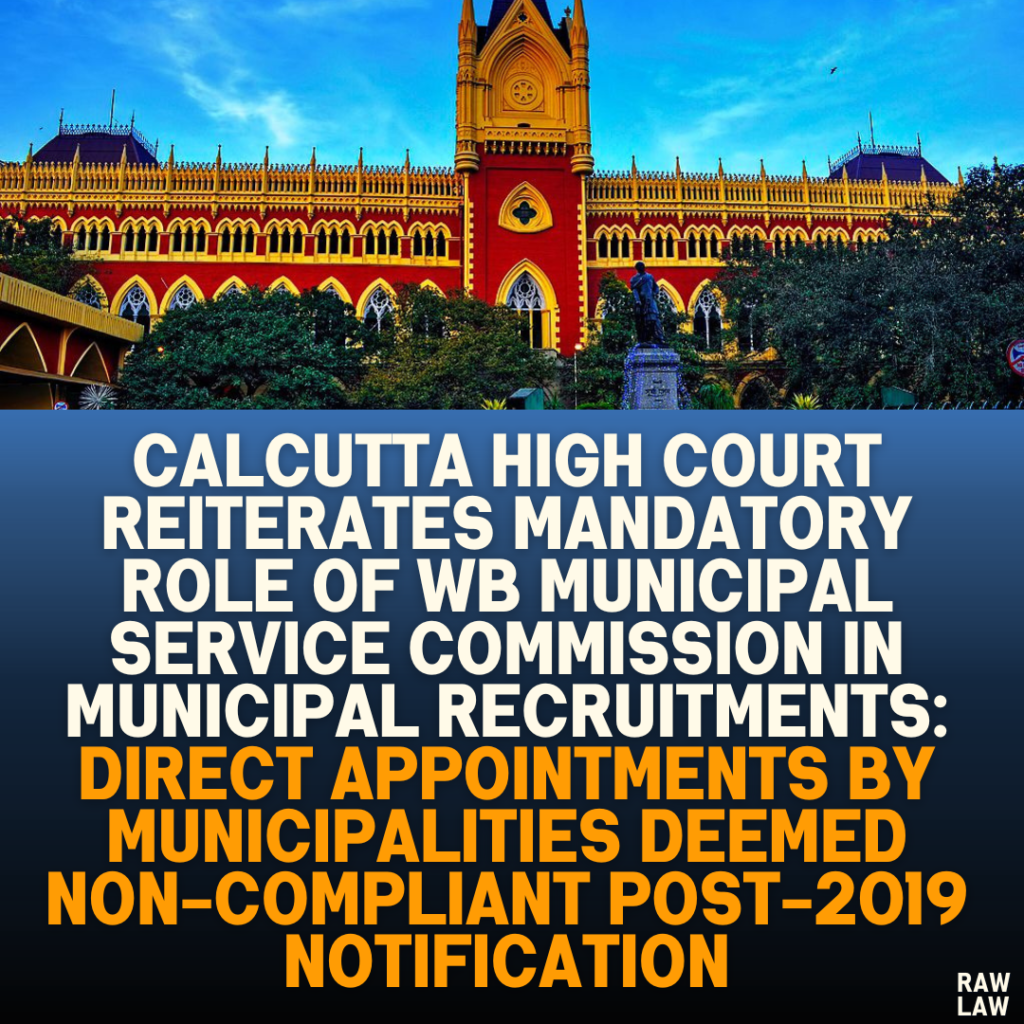Court’s Decision:
The High Court of West Bengal disposed of the public interest writ petition by directing the Government to reassert the mandate laid down in the notification dated January 9, 2019. The Court emphasized that all future recruitments by Urban Local Bodies (ULBs) and Development Authorities must be carried out exclusively through the West Bengal Municipal Service Commission (WBMSC). However, it held that recruitments conducted before January 2019 could not be reopened or scrutinized.
Facts:
- The petitioner filed a public interest writ alleging irregularities in the recruitment process undertaken by various municipalities in West Bengal.
- The recruitment in question was conducted directly by the municipalities, bypassing the WBMSC.
- The WBMSC was constituted under the West Bengal Act XII of 2018, notified in the Kolkata Gazette on September 13, 2018.
- By a notification dated January 2, 2019, the Chairman and Members of the WBMSC were appointed, making the Commission operational.
- On January 9, 2019, the Urban Development and Municipal Affairs Department issued a notification advising all municipalities and urban local bodies to route all recruitments through the WBMSC henceforth.
- Despite this directive, the petitioner claimed that several municipalities continued to make appointments independently.
Issues:
- Validity of recruitments conducted directly by municipalities: Were such recruitments in contravention of the statutory provisions and directives?
- Scope of compliance with the January 9, 2019 notification: Should the government ensure strict adherence to the notification to prevent further irregularities?
Petitioner’s Arguments:
- The petitioner contended that direct recruitment by municipalities without involving the WBMSC violated the West Bengal Act XII of 2018.
- It was argued that such actions undermined transparency, fairness, and standardization in the recruitment process.
- The petitioner sought a directive ensuring strict compliance with the notification issued on January 9, 2019.
Respondent’s Arguments:
- The State’s Response:
- The State emphasized that the WBMSC became functional only after January 9, 2019, following the issuance of the notification.
- It argued that recruitments carried out before January 9, 2019, were lawful and could not be reopened for scrutiny at this stage.
- Municipalities’ Defense:
- Municipalities defended their actions, citing operational constraints before the WBMSC’s establishment.
- They contended that the notification applied prospectively and did not affect earlier recruitments.
Analysis of the Law:
- The West Bengal Act XII of 2018 established the WBMSC to centralize and streamline the recruitment process for municipalities and ULBs.
- The notification dated January 9, 2019, was a binding administrative directive, mandating that all recruitments be routed through the WBMSC.
- The Court recognized that the notification’s prospective nature meant that recruitments conducted before January 9, 2019, were outside its scope.
Precedent Analysis:
Although the judgment did not explicitly reference earlier case law, the Court’s approach adhered to principles of:
- Administrative Law: Upholding statutory provisions and ensuring compliance with government directives.
- Non-retroactivity: Acknowledging that legal provisions and administrative notifications operate prospectively unless explicitly stated otherwise.
Court’s Reasoning:
- The Court emphasized the importance of the WBMSC in ensuring transparency, uniformity, and accountability in municipal recruitments.
- It acknowledged that while recruitments conducted before January 2019 could not be reopened, strict adherence to the January 9, 2019 notification was essential to prevent future irregularities.
- The directive issued by the government was held to be clear, unambiguous, and binding on all Urban Local Bodies.
Conclusion:
The High Court directed the Government of West Bengal to:
- Issue appropriate orders reiterating the mandate of the January 9, 2019 notification.
- Ensure that all municipalities and Urban Local Bodies strictly comply with the directive by making all recruitments exclusively through the WBMSC.
Implications:
- The judgment reinforces the statutory role of the WBMSC in municipal recruitments.
- It ensures adherence to principles of transparency and fairness, reducing the scope for arbitrary recruitment practices.
- By closing the door on reopening past recruitments, the Court balanced the need for compliance with the avoidance of administrative disruption.
- The judgment sets a precedent for strict enforcement of statutory provisions in public sector recruitments.
4o




Pingback: Supreme Court Allows Interim Release of Seized Truck Under NDPS Act: Balances Owner’s Rights and Evidence Preservation, Sets Conditions to Prevent Misuse - Raw Law